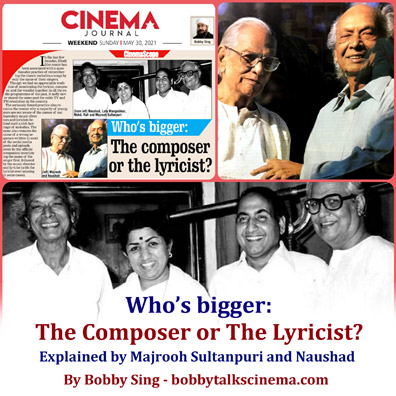
In the last few decades, Hindi film music has been associated with a questionable practice of remembering the classic melodious songs by only the name of their singers. Though we had an appreciable tradition of mentioning the lyricist, composer, and the vocalist together in all the radio programs of the past (before the ‘90s), the legendary vocalists still gained the major attention and fame due to their huge fanbase.
The situation actually became worse post the Cable TV and FM revolution in the country when the channels never cared to display the names of music directors and lyricists on the screen and radio jockeys rarely mentioned them in their programs (with RD Burman remaining an exception that calls for a separate debate). As a result, phrases like a Mohd. Rafi song a Kishore Kumar gem, a Lata Mangeshkar classic, a sad song by Mukesh and more got widely prevalent ignoring the real creators.
The seriously flawed practice also remains the reason why a big majority of youngsters are not aware about the actual process of a song-creation and the names of our legendary music directors and lyricists behind such rich heritage of melodies. The same also remains the cause of a wrong sequence written in most of the social media posts and uploads (even by the official audio/video companies) mentioning the name of the singer first, followed by the music director and lyricist (with the lyricist even missing in some cases).
The sequence can rightly be called irresponsible as the singer comes into the scene post the song has already been given birth to and has found its body and soul looking for a rendition. So, the singing part becomes the third important component of the song as a performance, which though remains crucially important, but still is a performance given under the guidance of the actual creators of the song - the composer and the lyricist as they conceived it to be.
That is exactly why a vocalist never claims a song to be his or her own, as it is not his/her creation. The real creators, the parents or the father and mother of a song, always remain the composer and the lyricist without any doubt. Reportedly, the debate over a singer’s contribution to the song also resulted in an ethical clash between Mohd. Rafi and Lata Mangeshkar in the ‘60s
The next argument in this context that created another known controversy between Sahir Ludhianvi and S.D. Burman is that who contributes more to a song and its creation, is it a lyricist or a composer? Though the question has been debated several times in the past decades, it’s actually like discussing which side of the coin adds more value to its existence? At times it’s the poetry that gets created first, later set to a tune, and at times it’s the tune (composition) that comes first on which the lyricist writes the words.
However, the particular question or confusion has never been countered or answered better than Majrooh Sultanpuri and Naushad, together remembering a personal experience of their life.
Narrated by Majrooh in a video interview, the incident is related to their ghazal ‘Aankhen Khuli Thi’ from Saathi sung by Mukesh (that got edited in the film), and a two-three years old, physically challenged son of their mutual friend, who couldn’t say a word and just kept watching the people around. As a weekly event, they all used to play Naushad’s new and old songs in their friendly get-togethers, when they once noticed the kid excitingly responding to this particular song enjoying it immensely. Every time the song was played, he used to swing sitting silent, forgetting all about his crying and everyone around.
After a few days, the kid sadly went into a coma and the doctors informed the family that they could take him home if they wish, as he has only a few days to live. They brought him home and kept praying, but the kid stopped responding. The father, then recalled his liking towards the song and thought of playing it with hope. Surprisingly, the kid opened his eyes as he heard the sound and kept listening to the song till the end. The moment it stopped, he closed his eyes again and left the world, leaving the family in shock.
The incident made a deep impact on both Majrooh and Naushad, but that isn’t the turning point of the story.
Post the tragic demise of the child, Majrooh told Naushad, “It was certainly the magic of your musical notes in the song that made the child move and regain consciousness. The music and its sound surely had a therapeutic impact as there is no way a kid of two-three years old could have understood the meaning of my poetry and the words. So, it was your music all the way that made a difference.”
To this Naushad responded, “No you are wrong.”
Explaining further, he said, “Actually, the words and music together created a sound and a particular frequency that fascinated the child and he used to respond to it. If we change the words, then the frequency would change too and it will no longer remain the same creation. So, your words are equally contributing and important along with the music as they together complete a song rendered perfectly, which is not possible otherwise”.
Personally, I couldn’t find any better conclusion to the debate to date with the maestros complimenting each other and I seriously feel this is the best conclusive reference to be quoted.
Cheers!
Bobby Sing
bobbytalkscinema.com
NOTE : The edited form of this article was first published in THE FREE PRESS JOURNAL Newspaper (Mumbai Edition) on 30th May 2021.
Note : The write-up is a chapter shared from my upcoming book releasing soon. So any additions, rectifications suggested by friends are welcome to make it better.
----------
 For more such interesting articles on lesser known facts on Hindi Cinema, do try DID YOU KNOW
For more such interesting articles on lesser known facts on Hindi Cinema, do try DID YOU KNOW Series by
Bobby Sing available in both
Book and
E-book form
.
Also available
at Notionpress and Flipkart stores (in India)


 For more such interesting articles on lesser known facts on Hindi Cinema, do try DID YOU KNOW Series by Bobby Sing available in both Book and E-book form.
For more such interesting articles on lesser known facts on Hindi Cinema, do try DID YOU KNOW Series by Bobby Sing available in both Book and E-book form.